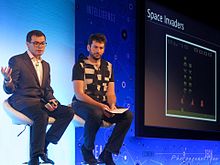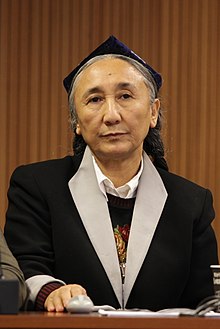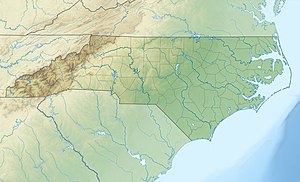스튜어트 비세
Stuart Vyse스튜어트 비세 | |
|---|---|
| 태어난 | 1950년 11월 18일 ) |
| 국적 | 미국인의 |
| 직업 | 행동과학자, 선생님, 작가 |
| 로 알려져 있다. | 초자연적 믿음에 대한 전문 지식 |
| 수상 | 1999년 윌리엄 제임스 북 어워드 '마법을 믿다' |
| 학력 | |
| 모교 | 로드아일랜드 대학교 |
| 논문 | 메틸페니데이트가 주의력 결핍 장애를 가진 아이들의 학습에 미치는 영향: 자극 동등성 패러다임 (1989) |
| 학술사업 | |
| 규율 | 심리학 |
| 하위 수양 | 행동과학 |
| 기관 | |
| 주목할 만한 작품 |
|
| 웹사이트 | stuartvyse |
스튜어트 비세는 미국의 심리학자, 교사, 연설가, 작가로서 미신과 비판적 사고를 전문으로 한다. 그는 연설자로 자주 초청되고 미신적 행동의 전문가로서 언론의 인터뷰를 받는다. 그의 책 마법을 믿다: 미신의 심리학은 미국 심리학 협회의 윌리엄 제임스 북 상을 수상했다.
교육 및 교수
Vyse는 Southern Illinois University Carbondale에서 영어 학사 및 석사 학위를 취득했다. 그는 로드아일랜드 대학에서 심리학 석사 및 박사 학위를 받았다. 그는 1987년부터 2015년까지 코네티컷 대학에서 가르쳤으며, 그곳에서 조앤 토르 커밍스 '50년 교수'를 지냈다. 프로비던스 칼리지와 로드아일랜드 대학교에서도 가르쳤다.[1][2][3]
Vyse는 The Analysis of Value Activity, The Action Analytics, The Symary Record의 편집 위원회에서 활동했다. 1997년부터 《회의론》지의 편집위원에 올랐고, 2015년부터 《회의론 인콰이어러》지에 '행동 & 신념' 칼럼을 썼으며, 여기서도 기고 편집위원이다.[1][4] Vyse는 또한 부모와 다른 사람들에게 과학적으로 불명확한 진행자 방식 의사소통 기법에 대해 교육하는 데 전념하는 웹사이트에 기고하고 있다.[5]
그는 두 개의 조직에서 펠로우십을 갖고 있다. 심리과학협회와 CSI 집행위원회에서도 활동하고 있다.[8]
미신과 비판적 사고
Vyse는 왜 사람들이 미신을 믿는지, 그리고 사람들이 어떻게 재정적인 결정을 내리는지를 설명하기 위해 미국 뉴스 매체들에 의해 자주 요구되고 있다.[4][9][10][3] Vyse는 미신이 사람들이 일어나기를 희망하거나 피하고자 하는 사건들에 대한 통제력을 어느 정도 갖기 위한 필요에서 나온다고 믿는다. 이 행동은 인간의 뇌가 사건에서 패턴을 감지하는 경향에 의해 강화된다. 심지어 그것들이 완전히 우연에 기인할 때에도 말이다. 예를 들어, 그것은 사람들이 좋은 결과를 행운의 매력에 귀속시키도록 동기를 부여한다. 불확실한 상황의 결과를 통제할 방법을 찾는 것은 어느 정도 위안을 준다. 이런 행동이 불안감을 줄이는 데 도움이 될 수도 있지만, 그것은 또한 사람들로 하여금 과도한 도박을 하게 하거나, 점술과 같은 신뢰할 수 없는 기술에 근거한 결정을 내리게 하거나, 예를 들어 실제 약물보다는 동종요법을 사용함으로써 건강을 위태롭게 할 수도 있다.[4][10][11][12][13][14][15][16]
Vyse는 인터넷에 떠도는 많은 양의 잘못된 정보와 "불행하고, 미신을 조장하는 거의 모든 것을 기꺼이 받아들이려는 의지가 있다"[11]는 불충분한 비판적 사고 능력 때문에 미신이 증가하고 있는 것으로 의심하고 있다. 회의론자로서 과학에[4] 기반한 공공정책을 옹호해 왔고 도널드 트럼프, 자이르 보우소나루 같은 포퓰리즘 국가원수에 대해 비판해 왔다.[17]
그는 비판적 사고, 논리적 오류, 논쟁에 관한 대학 수준의 세미나를 가르치곤 했다.[14] 그는 의사 소통 촉진과 같은 유사 과학에 기반한 의료 치료와 기술에 비판적이었다.[18]
비세는 미신은 종종 부모로부터 자식들에게 전해진다고 말하면서, 개신교인 그의 가족은 그가 자랄 때 미신에 탐닉하지 않았고 자신은 결코 미신을 믿지 않았다고 말했다.[4][19][20]
책과 책장
- Vyse, Stuart (2020). Superstition: A Very Short Introduction. Oxford: Oxford University Press. ISBN 978-0-198-81925-7.[9][21]
- Vyse, Stuart (2018-08-25). "Chapter 8: The Environment and Consumer Behavior". In Sloan Devlin, Ann (ed.). Environmental Psychology and Human Well-Being: Effects of Built and Natural Settings. Academic Press. ISBN 978-0-128-11481-0.
- Vyse, Stuart (2015-10-14). "Chapter 1: Where Do Fads Come From?". In Foxx, Richard M. (ed.). Controversial Therapies for Autism and Intellectual Disabilities: Fad, Fashion, and Science in Professional Practice, 2nd Edition. Routledge. ISBN 978-1-315-75434-5.
- Vyse, Stuart (2018). Going Broke: Why Americans (still) Can't Hold On To Their Money (Updated ed.). New York: Oxford University Press USA. ISBN 978-0-190-67784-8.
- Vyse, Stuart (2013). Believing in Magic: The Psychology of Superstition (Updated ed.). New York: Oxford University Press USA. ISBN 978-0-199-99692-6.
Vyse는 미국 심리학 협회에서 1999년 윌리엄 제임스 북 상을 받았다.[9][10]
선택된 저널 퍼블리싱
- Vyse, Stuart; Hemsley, Bronwyn; Lang, Russell; O. Lilienfeld, Scott; P. Mostert, Mark; D. Schlinger, Henry; Shane, Howard; Sherry, Mark; James, Todd (January 2019). "Whose words are these? Statements derived from Facilitated Communication and Rapid Prompting Method undermine the credibility of Jaswal & Akhtar's social motivation hypotheses". Behavioral and Brain Sciences. 42. doi:10.1017/S0140525X18002236 – via Researchgate.
- Vyse, Stuart (July 2018). "Superstition, Ethics, and Transformative Consumer Research". Journal of the Association for Consumer Research. 3 (4): 582–590. doi:10.1086/698869. S2CID 158721038 – via Researchgate.
- Vyse, Stuart (January 2018). "What's a Therapist to do When Clients have Pseudoscientific Beliefs?". The Behavior Therapist. 41: 36–39 – via Researchgate.
- Vyse, Stuart (2014). "The Science of Consequences: How They Affect Genes, Change the Brain, and Impact Our World". The Behavior Analyst. 37 (1): 57–59. doi:10.1007/s40614-013-0001-y. PMC 4883450.
- Vyse, Stuart (2013). "Changing Course". The Behavior Analyst. 36 (1): 123–135. doi:10.1007/BF03392295. PMC 3640877. PMID 25729135.
- Jayne Wyman, Alyssa; Vyse, Stuart (2008). "Science Versus the Stars: A Double-Blind Test of the Validity of the NEO Five-Factor Inventory and Computer-Generated Astrological Natal Charts". The Journal of General Psychology. 135 (3): 287–300. doi:10.3200/GENP.135.3.287-300. PMID 18649494. S2CID 19661869 – via Researchgate.
- Vyse, Stuart (2004). "Stability over time: Is behavior analysis a trait psychology?". The Behavior Analyst. 27 (1): 43–53. doi:10.1007/BF03392091. PMC 2755368. PMID 22478416.
기타 출판물
- Vyse, Stuart (2020). Critical Thinking: How to Effectively Reason, Understand Irrationality, and Make Better Decisions. Findaway World:Learn25. ISBN 9781632517777. OCLC 1175589323. Retrieved 16 March 2021.
외부 링크
참조
- ^ a b "44th Annual Convention; San Diego, CA; 2018". Association for behavior Analysis International. Archived from the original on 2019-08-25. Retrieved 2019-08-24.
- ^ Vyse, Stuart (30 June 2015). "Stuart Vyse psychologist & writer". stuartvyse.com. Archived from the original on 2019-08-26. Retrieved 2019-08-23.
- ^ a b "Author: Stuart Vyse". Skeptical Inquirer. Archived from the original on 2019-08-22. Retrieved 2019-08-21.
- ^ a b c d e Rocha, Camilo (2019-08-11). "Por que acreditar em superstições pode ser ruim para o mundo". Nexo (in Portuguese). Retrieved 2019-08-24.
- ^ "Contributors". Facilitated Communication (in American English). Archived from the original on 2021-05-14. Retrieved 2021-05-14.
- ^ "APS Fellows". Association for Psychological Science. Archived from the original on 2019-08-21. Retrieved 2019-08-21.
- ^ "Meet the new fellows of the Committee for Skeptical Inquiry". Center For Inquiry. 2015-10-16. Archived from the original on 2019-08-21. Retrieved 2019-08-21.
- ^ "Fellows". Skeptical Inquirer. 45 (1). 2021.
- ^ a b c "William James Book Award". Minnesota State University Moorhead. Archived from the original on 2019-08-22. Retrieved 2019-08-21.
- ^ a b c "Author: Stuart Vyse". Skeptical Inquirer. Archived from the original on 2019-08-25. Retrieved 2019-08-24.
- ^ a b "Why You Believe In Ghosts, Even Though You Know Better". Huffington Post. 2014-10-30. Archived from the original on 2019-08-22. Retrieved 2019-08-21.
- ^ Goldhill, Olivia (2016-08-13). "Athletes who wear "lucky socks" aren't wrong: Psychologists say superstitions yield real advantages". Quartz. Archived from the original on 2019-08-24. Retrieved 2019-08-24.
- ^ Vyse, Stuart (2018-05-18). "Why Are Millennials Turning To Astrology?". Skeptical Inquirer. Archived from the original on 2019-08-24. Retrieved 2019-08-24.
- ^ a b Novella, Steven (2006-11-10). Skeptics' Guide to the Universe Episode #64 (Podcast). SGU Production. Event occurs at 36:00.
- ^ Flatow, Ira (2003-08-29). Science and Pseudoscience (Radio program). NPR.
- ^ Gomez, Ana (2019-08-09). "Entrevista: Las supersticiones cambian la salud (para bien y para mal)". Noticias RTV (in Portuguese). Archived from the original on 2019-08-25. Retrieved 2019-08-24.
- ^ Alves, Gabriel (2019-08-11). "Equiparar ciência a opinião atende a interesses e destrói conhecimento". Fohla de S.Paulo (in Portuguese). Archived from the original on 2019-08-25. Retrieved 2019-08-24.
- ^ Vyse, Stuart (2018-08-07). "Autism Wars: Science Strikes Back". Skeptical Inquirer. Archived from the original on 2019-08-24. Retrieved 2019-08-24.
- ^ Kaneria, Krupa (2017-01-13). "Q&A with Friday the 13th debunker Stuart Vyse". The Daily Tar Heel. Archived from the original on 2019-08-24. Retrieved 2019-08-24.
- ^ "Medo dos deuses deu origem às superstições, diz o psicólogo Stuart Vyse". Paulopes.com (in Portuguese). 2019-08-24. Archived from the original on 2019-08-25. Retrieved 2019-08-24.
- ^ Vyse, Stuart (26 December 2019). Superstition: A Very Short Introduction. Oxford University Press. ISBN 9780198819257. Archived from the original on 2019-08-22. Retrieved 2019-08-21.


